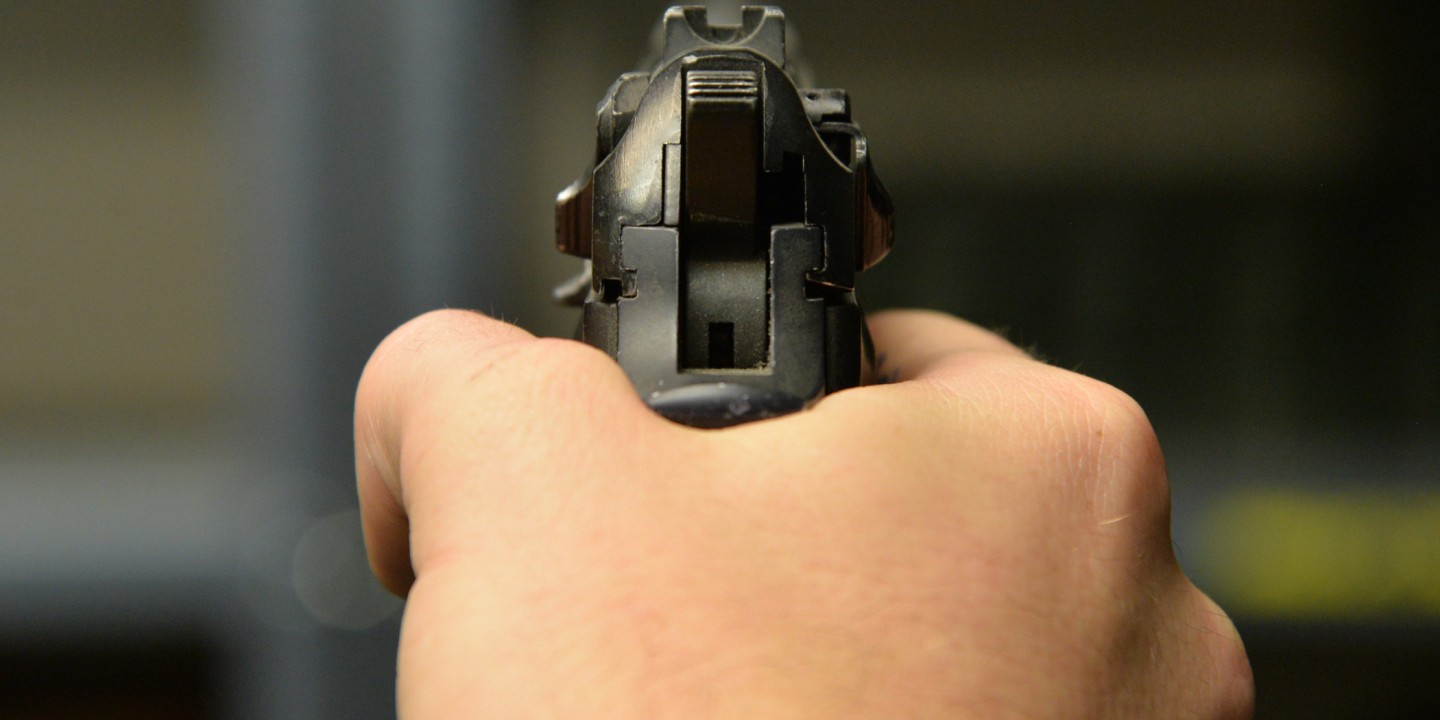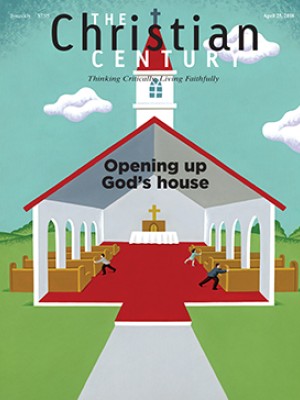Why are the “good guys with guns” so sure they're good?
"It's a sin problem," goes the slogan, "not a gun problem." Whatever definition of sin is operative here, it isn't Paul's.

Mass shootings are familiar enough now that the aftermath follows a script. One line you can pretty much count on hearing: It’s a sin problem, not a gun problem. The slogan has been offered to reporters by everyone from church security consultant Mike Gurley to Duck Dynasty’s Si Robertson; it’s been cited in pulpits and letters to the editor across the country.
It’s a distinctly American statement. It takes for granted the relative cultural strength of both gun enthusiasts and evangelical Protestants, and it casts these two very different groups as practically synonymous. It also shifts attention to the main area of deeper commonality they do share: an emphasis on individual responsibility. Responsible individuals often own guns, goes the argument, and why shouldn’t they? Irresponsible individuals sin too much, and they should stop.
Read our latest issue or browse back issues.
When American Christians—of whatever political ilk—talk about sin, they usually mean the bad things a given person does. Everyone’s actions include some sinful ones; that assertion is uncontroversial. Yet this notion of discrete, individual sins makes it easy to maintain that while all have sinned, most can count on never sinning all that badly. From there it’s no big leap to a functional belief—all Protestant protestations aside—that some people are just better. Maybe not in the eyes of God, but for all practical purposes.
Indeed, this rhetoric of the comparatively minor sinner—the kind of person whose sin engine has a reliable governor installed—is all around us. Sure I’m a sinner, but I’m not the least bit racist. All have sinned, but I for one would never steal, or cheat, or treat other people abusively. Everyone sins, but I’m the sort of person who can be trusted to own a gun without ever using it to hurt someone, or neglecting to keep it away from someone else who’s a more serious sinner than I am.
Enter the storied “good guy with a gun.” The premise is that to stop bad people from doing violent damage, better people need to be able to intervene with comparable force. This takes much for granted: that lightly trained civilians will assess a threat accurately and respond without making things worse; that they will have the resolve to engage an active shooter even if it’s their neighbor or colleague or 13-year-old student; that the police, when they arrive, will be able to intuit which guy with a gun is the good one. As Adam Weinstein, a self-described gun lover and wannabe hero, put it in a 2014 Gawker post, “it’s really hard to be a good guy with a gun.”
The truth of that statement goes much deeper than Weinstein’s focus on the challenges of stopping an active shooter. It’s also just really hard to be consistently good in the first place. As Weinstein details, it takes a lot of optimism about your own discernment and coolness under pressure to imagine yourself as the good-guy hero in a bad-guy scenario. But it takes even more optimism about human nature itself to imagine that we good people can be absolutely certain our goodness will never waver. Yet the ranks of good guys with guns keep growing. People seem confident that they’ve got this good-guy stuff down, that their bad deeds will forever remain minor ones.
Much more could be said about where such a view of one’s own sinfulness might come from. Here’s one place it does not come from: the apostle Paul. The church’s first great theologian does not generally talk about sin in terms of individual bad things people choose to indulge in or learn not to. For Paul, sin is a power that rules over us. It’s not something we can keep under control; it’s something that controls us.
The classic treatment of the theme is in Romans 7: “I do not understand my own actions,” writes Paul. “For I do not do what I want, but I do the very thing I hate. . . . I can will what is right, but I cannot do it.” Paul suggests that on those occasions when he fails to do what’s right, sin itself is the one exercising agency: “It is no longer I that do it, but sin that dwells within me.” The power of sin takes over.
Now, much ink has been spilled over who exactly the I is in this passage. Luther and Calvin, following Augustine and Aquinas, maintain that Paul is speaking personally and in the present tense, post conversion: whatever profound changes the Damascus road wrought, it didn’t cure Paul of the tendency to do the evil he does not want. Romans 7 looms large in Luther’s conviction that Christians are sinners and saints at the same time. Others read Paul as speaking in the past tense, of his pre-Christian days as Saul; still others don’t take the I that literally in the first place.
But what’s at stake in this passage is not just the nature of salvation but also the nature of sin itself. And even the most steadfast Holiness revivalist who pitches a tent and preaches spiritual perfection available today can see the evidence: sin is powerful and wild and unpredictable, and we don’t know who it will afflict most severely or with the direst consequences. (You could try to pass a law limiting gun licenses to the sanctified, but the verification procedures would pose a few challenges.) Sin overpowers people, and not just the ones we might expect it to overpower.
To be sure, most people’s sinful actions rarely if ever cross the line into dangerous, violent behavior. By this standard, most of us are mostly good most of the time. But it’s very difficult to predict which of us won’t be, and just how bad we’ll be, and when. The fact that gun owners are sinners like anyone else certainly doesn’t mean they’re likely to use their guns to hurt people. Few do. But they can’t be positive they’ll never find themselves among that violent few, because Romans 7 doesn’t just apply to other people. And there are just so many gun owners in America, with so many powerful guns. There are so many “good guys with guns” that even the tiny percentage of them that turn out not to be so good after all adds up to a lot of shooters, a lot of shootings, and a whole lot of bloodshed.
The United States has more guns than people. Its civilians own nearly as many guns as the rest of the world’s civilians combined. And public health researchers have found a strong correlation between gun ownership rates and homicide rates. More people are killed in the U.S. than in countries where fewer households have guns; the same finding holds when you compare American states. Yes, this specific gun owner or that one will probably stay safe and responsible. But in the aggregate, more guns always means more people killed.
So we face a two-part problem. The power of sin puts a major asterisk next to the phrase “good guy with a gun.” Meanwhile, the vast American arsenal scales up the havoc this sin-power can readily wreak. A measure of progress might be made on the first problem—theological accounts differ on that point—but it’s not going away this side of the eschaton. That leaves the second: to make a serious dent in the carnage, we have to get rid of a significant number of the guns.
This is plainly not on the agenda in the United States. Since the Parkland school shooting in Florida, a variety of policy proposals have been debated. These include arming teachers, a troubling idea that goes all in on the notion of good guys with guns. Other proposals represent genuine positive steps, but very small ones. Stronger background checks, stricter age limits, quicker intervention when someone is identified as a threat—these would all help prevent certain shootings. That’s a big deal if the life that’s saved happens to be your own or your loved one’s. But it doesn’t begin to approach the scale of the crisis.
That’s because these are all narrow efforts to address the problem at the level of the individuals deemed most likely to do spectacularly bad things. (Likewise with the #WalkUpNotOut campaign, which urged teenage activists to stop talking about gun control and start talking about peer intervention.) The far greater problem is that we can never really know all or even most of the names on that list. While it won’t include many of us, it might include any of us. And whoever it includes, God help them and those around them if they happen to be in possession of one of the nation’s 357 million guns.
Real progress depends on that number coming down. A good start would be to reinstate the federal ban, in place from 1994 to 2004, on the manufacture of certain semiautomatic weapons for civilian use. But to get U.S. gun deaths down within the range of other developed countries, more drastic measures are required. Switzerland, where there is a strong pro-gun culture, leads Europe in gun deaths. The U.S. has three times as many gun deaths. It also has four times more guns per capita than Switzerland does—more guns means more killing. So a large-scale ban and buyback program is what it would take to address the problem, something along the lines of what Australia enacted after the 1996 mass shooting in Port Arthur, Tasmania.
It’s hard to see a political path to this sort of action in the United States. But let’s at least be clear about what we face. The American epidemic of gun violence is both a sin problem and a gun problem; the question is which problem we have the ability to solve. Sin is a power much stronger than us or our individual efforts. Defeating it is an ongoing cosmic project initiated by one greater than us who will complete it, but not on our timetable. Our task is to deal with the other problem: the physical instruments of death that sin has at its disposal. We can’t just keep them away from the bad people, because the bad people might well be us. We have to reduce our firepower.
A version of this article appears in the print edition under the title “Sinner-saints with guns.”






